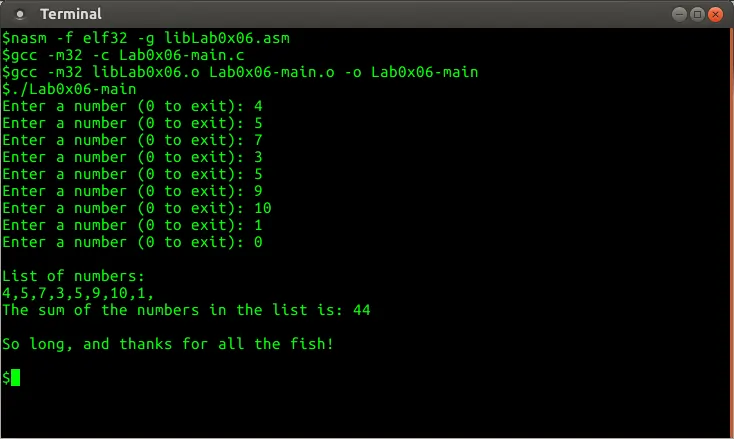The homework deals with implementing an assembly function to sum and display an array using x86 assembly. The function is used by the main function which is implemented in C. The function uses the x86 calling convention and uses the standard C library function printf to display the array. The function uses the stack to read the arguments and save the registers used. Below is how to call x86 assembly functions demonstrated by our C programming homework help experts.
Summing and Displaying an Array

section .data
format: db "%d,",0
section .text
global _sumAndPrintList
extern printf
; Sum and print list,
; C Prototype:
; int _sumAndPrintList(int *list, int length);
_sumAndPrintList:
push ebp ; save ebp
mov ebp,esp ; move stack pointer to ebp
push ebx ; save ebx contents on the stack
push esi ; save esi contents on the stack
mov esi,[ebp+8] ; read the array pointer from the stack into esi
mov ecx,[ebp+12] ; read the array length from the stack into ecx
mov ebx,0 ; ebx will contain the sum, start in zero
printLoop:
mov eax,[esi] ; load a word from the array
add esi,4 ; advance to next word in array
add ebx,eax ; add number to the total sum
push ecx ; save value of ecx
push eax ; push value to print in the stack
push format ; push printf format
call printf ; print number on screen
add esp,8 ; restore stack by popping the 2 arguments
pop ecx ; restore ecx value
loop printLoop ; repeat for all the numbers in array
mov eax,ebx ; put sum in eax to return the value
pop esi ; load old contents of esi from the stack
pop ebx ; load old contents of ebx from the stack
pop ebp ; load old contents of ebp from the stack
ret ; return to calling function
#include
extern int _sumAndPrintList(int *list, int length);
int main()
{
int list[1000]; // list of 1000 numbers
int count,done,sum;
count = 0;
done=0;
while(done==0) // read while the user is not done entering numbers
{
printf("Enter a number (0 to exit): ");
scanf("%d",&list[count]); // read the number and save it in the list
if(list[count]==0) // if the user entered a zero, terminate
{
count--; // discard the 0
done=1;
}
count ++;
if(count>=1000) // if the user entered 1000 numbers, terminate
{
printf("You have entered 1000 numbers!\n");
done=1;
}
}
printf("\nList of numbers:\n");
sum=_sumAndPrintList(list,count);
printf("\nThe sum of the numbers in the list is: %d\n",sum);
printf("\nSo long, and thanks for all the fish!\n\n");
return 0;
}
Related Samples
Discover our free C assignment samples to enhance your programming skills. Each sample is crafted to demonstrate essential concepts and effective coding techniques in C.
C
C
C
C
C
C
C
C
C
C
C
C
C
C
C
C
C
C
C
C